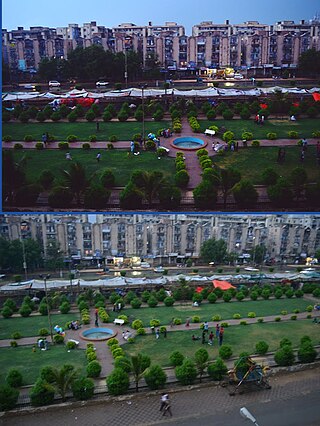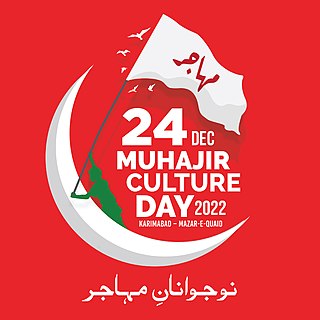A nation is a large type of social organization where a collective identity has emerged from a combination of shared features across a given population, such as language, history, ethnicity, culture, territory or society. Some nations are constructed around ethnicity while others are bound by political constitutions.
Hindutva is a political ideology encompassing the cultural justification of Hindu nationalism and the belief in establishing Hindu hegemony within India. The political ideology was formulated by Vinayak Damodar Savarkar in 1922. It is used by the Rashtriya Swayamsevak Sangh (RSS), the Vishva Hindu Parishad (VHP), the Bharatiya Janata Party (BJP) and other organisations, collectively called the Sangh Parivar.

The Muttahida Qaumi Movement (MQM), previously known as Muhajir Qaumi Movement, is a secular political party in Pakistan that was founded by Altaf Hussain in 1984. Currently the party is split between 2 main factions. MQM-London faction is controlled by Altaf Hussain from London, while MQM-Pakistan is run by Khalid Maqbool Siddiqui based in Pakistan. Its electoral symbol was a kite.

Gulistan-e-Jauhar or Gulistan-e-Johar is a prominent neighborhood in the Karachi East district of Karachi, Pakistan. Famous for its vibrant culture, Gulistan-e-Jauhar is named after Maulana Mohammad Ali Jauhar, a prominent figure in the Pakistan Movement. The neighborhood is distinguished by a myriad of apartment blocks, contributing to its dynamic urban landscape.

The All Pakistan Muttahida Students Organization is a Pakistani student organization notable for creating a political party: the Mohajir Quami Movement, now called the Muttahida Qaumi Movement (MQM).
Anthony David Stephen Smith was a British historical sociologist who, at the time of his death, was Professor Emeritus of Nationalism and Ethnicity at the London School of Economics. He is considered one of the founders of the interdisciplinary field of nationalism studies.

The Sindhudesh Movement is a separatist movement, based in Sindh, Pakistan, seeking to create a homeland for Sindhis by establishing an ethnic state called Sindhudesh, which would be either autonomous within Pakistan or independent from it.
There are or have been a number of separatist movements in Pakistan based on ethnic and regional nationalism, that have agitated for independence, and sometimes fighting the Pakistan state at various times during its history. As in many other countries, tension arises from the perception of minority/less powerful ethnic groups that other ethnicities dominate the politics and economics of the country to the detriment of those with less power and money. The government of Pakistan has attempted to subdue these separatist movements.

Muttahida Qaumi Movement (Pakistan) (Urdu: متحدہ قومی موومنٹ (پاکستان)Muttaḥidah Qọ̄mī Mūwmaṅṫ Pākistānabbr.MQM-P) is a social liberal, Muhajir nationalist, and secularist political party. The leader of the party is Khalid Maqbool Siddiqui The party's symbol is the kite. It is mostly active in Karachi where up to majority of Muhajirs currently reside. The party aims to represent the Human rights of Muhajirs in Pakistan through peaceful and democratic struggle. The Party is a splinter faction of Muttahida Qaumi Movement – London.

Sindhi nationalism is an ideology that claims that the Sindhis, an ethnolinguistic group native to the Pakistani province of Sindh, form a separate nation. After Bangladesh became independent in 1971, G.M. Syed gave a new direction to nationalism and founded the Jeay Sindh Mahaz in 1972 and presented the idea of Sindhudesh; a separate homeland for Sindhis. G.M. Syed is considered as the founder of modern Sindhi nationalism. However, Sindhi nationalists stand divided upon the idea of a separate country or autonomy within Pakistan.

Pakistan is one of the world's most ethnically and linguistically diverse countries. The major Pakistani ethnolinguistic groups include Punjabis, Pashtuns, Sindhis, Gujjar, Saraikis, Muhajirs, Balochs, Paharis and Brahuis, with significant numbers of Baltis, Kashmiris, Chitralis, Shina, Kohistanis, Torwalis, Hazaras, Burusho, Wakhis, Kalash, Siddis, Uzbeks, Nuristanis, Pamiris, Hindkowans, Kyrgyz, Turkmen, Uyghurs and other various minorities.

The Muhajir people are Muslim immigrants of various ethnic groups and regional origins, and their descendants, who migrated from various regions of India after the Partition of India to settle in the newly independent state of Pakistan. The community includes those immigrants' descendants, most of whom are settled in Karachi and other parts of urban Sindh. The Muhajir community also includes stranded Pakistanis in Bangladesh who migrated to Pakistan after 1971 following the secession of East Pakistan in the Bangladesh Liberation War.
Muhajir culture is the culture of the various Muslims of different ethnicities who migrated mainly from North India in 1947 generally to Karachi, the federal capital of Pakistan and before 1947 Karachi is the capital of Sindh. They consist of various ethnicities and linguistic groups. The Muhajirs are mainly concentrated in Karachi and Hyderabad.
Wajahat Masood is a Pakistani journalist, columnist and political analyst. He is widely considered to be a liberal, and a human rights activist. He is currently working with the Urdu-language newspaper Daily Jang. He has earlier worked with BBC and other organisations. He is currently the chief editor of humsub Urdu & humsub English

Slovak nationalism is an ethnic nationalist ideology that asserts that the Slovaks are a nation and promotes the cultural unity of the Slovaks.
Syed Akbar Hussain is a Pakistani political economist, academic and author. He is currently serving as the Executive Director of the Institute of Business Administration (IBA) in Karachi.
National Rahmatul-lil-Alameen Wa Khatam an-Nabiyyin Authority is an ideological institution of the Government of Pakistan. Set up under the Federal Ministry of Education & Professional Training by the former Prime Minister Imran Khan in October 2021, the first Chairman was Ijaz Akram. The ordinance to set up the authority was promulgated by President Arif Alvi on 13 October 2021. In July 2022, JUI-F former MNA Shahida Akhtar Ali suggest the new name of the authority by adding Khatam an-Nabiyyin, which was endorsed by President of Pakistan, Arif Alvi per suggestion as National Rahmatul-lil-Alameen Wa Khatam an-Nabiyyin Authority formerly National Rahmatul-lil-Alameen Authority.

Muhajir Cultural Day is a Muhajir cultural festival. It is celebrated to highlight the modern Muhajir and Urdu-speaking culture.The day is celebrated all over Karachi and amongst the Muhajir diaspora worldwide. Muhajirs celebrate this day to demonstrate the identity of Muhajir culture and acquire the attention of the world towards their heritage.
Persecution of Muhajirs or Human rights abuses against Muhajirs or Anti-Muhajir sentiment ranges from discrimination, mass killings, forced disappearances and torture, to political repression and suppression of freedom of speech of Muhajirs, mainly those belonging to the right wing party Muttahida Qaumi Movement – Pakistan.
Kamran Tessori is a Pakistani politician and businessman, currently serving as the Governor of Sindh since 9 October 2022. Tessori is a member of the Muttahida Qaumi Movement – Pakistan party.03166092560









